Quick reaction, analysis on Jazz trade for John Collins

For more than a year, the Utah Jazz have been rumored to have interest in forward John Collins, but the price tag always seemed a little too steep.
Past iterations of a potential deal between the Jazz and Atlanta Hawks have included multiple rotation-level players and even future first-round picks. As recently as February, there were reports the Hawks had been seeking the inclusion of both Jarred Vanderbilt and Malik Beasley in a deal with the Jazz. But patience proved to be a valuable virtue for the Jazz.
League sources confirmed Monday that the Jazz would be sending Rudy Gay and a future second-rounder to the Hawks in exchange for Collins in a deal that can’t be made official until July 6.
From the Jazz’s perspective, the deal is a no-brainer. Collins, who turns 26 in September, bolsters the Jazz roster with a proven starting forward who is under contract through the 2025-26 season. The cost for the Jazz is of exceptional value. Gay, at the tail end of his career, did not figure to have a large role for the Jazz and with so many future first-round picks in the asset chest, the Jazz could easily afford to send out a future second.
Related
When it comes to building a team through the NBA draft, character matters
A few things you likely didn’t know about the Jazz’s new additions
‘A fortunate turn’: How the Jazz landed two players on their top-10 list
On first glance, many wondered what this deal might mean for rookie Taylor Hendricks, who the Jazz drafted on Thursday night with the No. 9 overall pick. Though Hendricks and Collins play the same position, head coach Will Hardy is not a believer in handing out minutes without them being earned, so Hendricks was going to have to prove himself in order to get playing time in the first place.
Additionally, while coming into the league with a ton of talent and skill, Hendricks is going to have to get stronger and learn how to deal with NBA-level opposition. Collins not only provides a perfect person for Hendricks to look up to and learn from, but also gives the Jazz the ability to win while Hendricks develops.
On the Hawks’ side of things, you might wonder why they would give up Collins for such a small asking price, especially considering what they were rumored to have been seeking before.
In recent months, league sources have indicated that Hawks ownership has been insistent on only paying a premium price for a team that could be a legitimate title contender.
Getting away from Collins’ $25 million per year contract gives Atlanta financial flexibility. According to ESPN’s Bobby Marks, the Hawks are using a trade exception to bring in Gay, who exercised his $6.4 million player option as a part of the trade. Also, the Hawks create a $25.3 million trade exception while moving below the luxury tax line, which gives them the option of using the full non tax-payer mid-level exception this season.
Even after adding Collins’ contract to the books, the Jazz will still have cap space to work with this summer. If one or both of Talen Horton-Tucker and Jordan Clarkson decline their player options, that would only give the Jazz more cap space to work with.
The Jazz are surely not done making moves to finalize their 2023-24 roster, so the rest of the summer will have to play out before we know what it will all mean for the team moving forward.


